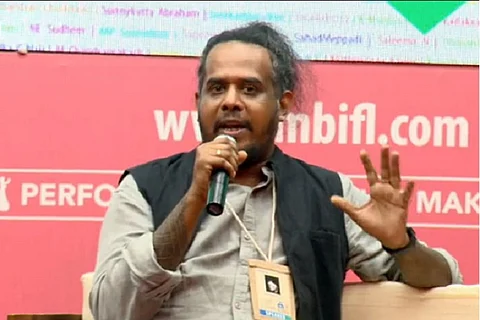

There would not be a single Sabarimala devotee who has not heard veteran singer Yesudas sing ‘Harivarasanam’ (a Hindu prayer song), says Job Kurian, singer and musician. “It is that harmony that is the beauty of India,” Job says. He is answering a question posed by music critic Ravi Menon at the Mathrubhumi Festival of Letters in Thiruvananthapuram. Ravi asks Job and musicians Harish Sivaramakrishnan and Resmi Sateesh the same question. Is there a recent trend of mixing religion with music, a trend unseen before, in all the years of music in the film and non-film industries?
All three musicians call it a dangerous trend, one that brings fear. Harish, vocalist of the band Agam, carnatic singer and an IT professional living in Bengaluru, says that while he agrees with Job’s sentiments, it is also dangerous when you quote examples such as Yesudas (who has a Christian name) singing a Hindu hymn, because then, you are identifying a singer by his religion.
“That’s what they want us to do. Those who say that non-Hindus shouldn’t sing Hindu hymns or criticise the hailing of Christian gods in a Carnatic song are the ones who wouldn’t listen to a full Carnatic concert. They are the ones who will say you shouldn’t sing if you have long hair or a tattoo. We shouldn’t write off these people as some fools talking. They are dangerous. To fight it, everyone should democratically learn and teach music,” Harish says.
Resmi reiterates, there’s no language or religion for music, it is a ‘flowing media’. Ravi had also asked the three singers earlier about the importance of language, lyrics, and the lines of a song. Lines are important, but beyond lines is the music, says Harish. If he sings a Baburaj (renowned composer of early Malayalam films) composition elsewhere, non-Malayalis would have no clue what a certain powerful poetry meant, but they would identify the melody, the emotion.
Resmi, who has made Inchakkad Balachandran’s environmental song ‘Ini Varnnoru Thalamurakku’ all the more popular after singing it for a protest, says, “It is very important where those lines are placed. When I sang it for the nilpu samaram (standing protest by tribal people for land rights) in 2014, mine became a voice of the voiceless. A family that came to visit the beach happened to shoot it on their phone and the video became viral. But the song has been there for so many years, even I have made a music video of it years earlier. But in that situation, that time and place, it got a lot more recognition than it ever did.”
The musicians also spoke about film music versus independent music in Kerala. Music in India is so closely linked to film music that independent music, after all these years, still struggles to get attention, Ravi Menon observes. Harish says that it only means you have to work all the more on your independent music. Job modestly names a number of film musicians who have inspired him before admitting that travelling to other places opened a whole new world of independent music. Resmi says, “I believe music has this immortal power and the form doesn’t matter.”
The session came alive with song renditions by all the speakers, between their discussions on all that’s music.